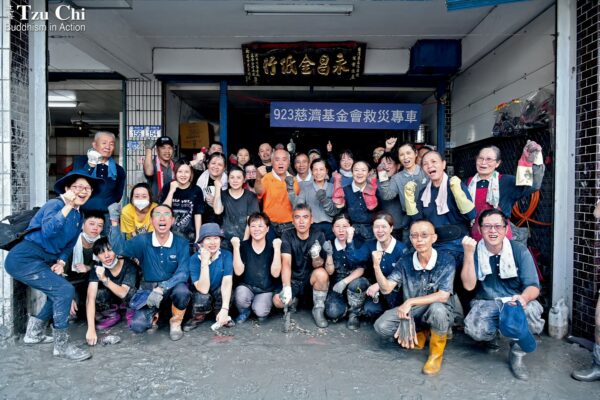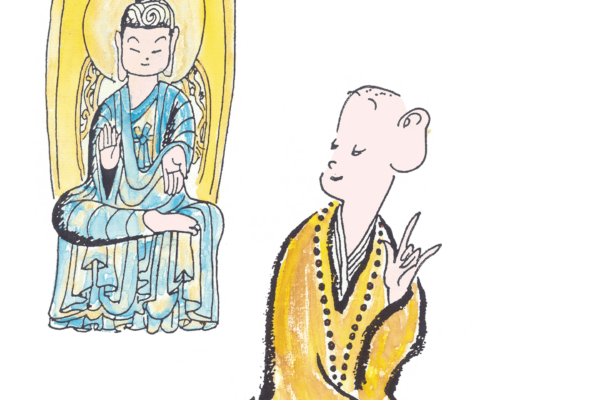By Cecelia GC Ong
Translated by Wu Hsiao-ting
Volunteers conducted a free clinic event and subsequently followed up with patients to provide additional assistance for those who required further treatment.
Anarmati, 24, held her ten-month-old daughter in her arms as she waited in line for a medical consultation at a Tzu Chi free clinic. The mother’s eyes were lifeless, her face bloated.
A kidney screening was being conducted at the event. Anarmati handed over her urine sample cup to a doctor. Preliminary results showed abnormalities, so the medical team referred her to a medical testing lab for further testing. However, the cost of testing—1,800 Nepalese rupees (US$13.7)—was beyond her means. Clutching the referral slip in her hand, she left the event venue feeling dejected.
The free clinic was held from November 4 to 6, 2022. Following the event, volunteers implemented a case-tracking mechanism. Dr. Tang Kiat Beng, deputy CEO of Tzu Chi Malaysia, discussed Anarmati’s case with Venerable Bhikkhu Maitri, head of the International Buddhist Society. They decided to arrange for Anarmati to undergo further medical examinations.

Volunteer Lim Kim Yan, a retired head nurse, treats a child’s tinea capitis, a fungal infection of the scalp. Tzu Chi volunteers came across the child while carrying out home visits in rural Lumbini. To prevent his tinea capitis from worsening, they purchased medicine from a pharmacy to treat him.
Li Guo Xiang
Working to relieve suffering from illness
On November 27, 2022, several fellow volunteers and I piled into a small car and traveled to a rural area in Lumbini to visit Anarmati.
When we arrived in the area, volunteer Lim Kim Yan, a retired head nurse from Singapore, took the lead and guided us to Anarmati’s home. On the way, she said, “I don’t understand why this 24-year-old woman has to suffer so much.” I asked, “How many times have you come to see her?” She replied, “This is my third visit to her. I first saw her at the free clinic where she was wearing a headscarf and cradling her child. That image has stayed with me.”
Sister Kim Yan looked at the narrow path in front of her and continued without waiting for a response from me: “Anarmati has two children. Her son is three years old, and her daughter is only ten months old. She started feeling unwell some time ago. Her husband took her back to her parents’ home and never returned.” Even though Sister Kim Yan spoke in a neutral tone, we could sense her deep empathy for Anarmati. Her explanation also enlightened us on the vulnerable circumstances surrounding the young mother.
A partially completed two-story building came into view after we had walked through a narrow, shabby alley. The building had walls but no doors or windows, and the second floor only had steel frames without a roof. Sister Kim Yan turned to us and said, “The one sitting on the ground is Anarmati.” Following her pointed finger, I saw through the morning fog a woman sitting barefoot on a pile of rubble, holding a sleeping baby girl in her arms.
Sister Kim Yan walked up to Anarmati. As she approached, the sudden movement startled the flies on Anarmati’s body, causing them to fly around. Sister Kim Yan didn’t hesitate but instead moved closer to her, bent down, and greeted her with, “Namaste,” a Nepalese greeting. She pointed at a blood pressure monitor she had brought. Anarmati didn’t speak or look up; she just extended her arm, allowing Sister Kim Yan to put the cuff on her. The reading indicated that Anarmati’s blood pressure was a bit high. Sister Kim Yan showed the reading to Dr. Tang Kiat Beng, who had come with us. The physician stepped up to Anarmati and squatted in front of her.
After performing a brief examination on the young mother, Dr. Tang shifted his position, inadvertently allowing the morning sun to shine directly on the baby girl in her arms. The infant rubbed her eyes and made some soft cooing sounds. Anarmati swiftly used her thick headscarf to shield her daughter from the light, lovingly tending to her little one.
A group of villagers had gathered around us by that time, including a woman wearing a red sari. The woman was familiar with Tzu Chi because she had previously participated in one of our hot meal distributions. She sat down next to Anarmati and answered our questions. According to her, Anarmati had returned to her parents’ home five months before; her husband had taken their son with him. We asked when Anarmati’s husband would come to take her back to her in-laws’ home, and the woman explained: “In accordance with our customs, Anarmati’s son will have a head-shaving ceremony in a few days, and Anarmati will go back to India to attend it.” “Will she stay at her in-laws’ after the ceremony?” we asked. The woman didn’t respond but instead looked silently at Dr. Tang.
Dr. Tang took a look at Anarmati and picked up where the woman had left off, “The head-shaving ceremony requires the mother to be present, so they let her go back. But after the ceremony, she will be sent back to her parents’ home. Isn’t that correct?” The woman answered, looking uneasy: “Anarmati is sick. Her husband can’t take her back.” Dr. Tang stood up and exclaimed, “This is heartbreaking!”
We didn’t know if Anarmati could understand our conversation. She had remained expressionless throughout it all. She had remained completely still, too, allowing many flies to land or perch on her long hair and purple sari.
Sister Kim Yan appeared a little anxious when she saw Dr. Tang stand up. “Dr. Tang,” she asked, “can we arrange for her to see a specialist to delay the onset of kidney failure?” Dr. Tang squatted back down and asked Anarmati, “Would you like us to take you to a hospital to see a doctor?” Anarmati replied through the woman in the red sari: “Yes.”
Anarmati’s laughter
Anarmati’s father had worked away from home to earn enough money to build a sturdy house for his family. However, as the Chinese saying goes, “A storm may arise from a clear sky; fortunes can turn in a day.” Life is governed by impermanence, and sadly, their home was only half-built when her father fell ill and passed away.
During our visit to the family, we noticed a rice sack hanging on a wall of the unfinished house, used to cover up a hole. A neighbor informed us that Anarmati’s family had received aid from Tzu Chi before. We pointed out the Tzu Chi logo on the rice sack to Anarmati’s mother, and then pointed at the logo on our volunteer uniforms. She looked surprised and then broke into a smile.
After that, we began using gestures and a mix of Mandarin, English, and strange-sounding Nepali to communicate with Anarmati’s mother. We must have looked awkward and funny in our attempts to convey our messages to her because suddenly Anarmati burst into laughter. Dr. Tang jumped up with joy and exclaimed, “She finally laughed!”
When it was time for us to leave, Anarmati stood up to see us off. Her smile was as beautiful as the white bottle gourd flowers blooming on a nearby rooftop, filling us with hope.
Once we got back in our car, Sister Kim Yan wasted no time and started calling the hospital we were taking Anarmati to, paying no attention to the bumpy ride. After finishing her call, she turned to face us from the front seat and announced, “It’s confirmed. Anarmati can see the specialist on the 29th.”
However, things didn’t go as planned. We contacted the family soon afterwards, only to learn that Anarmati had been taken to attend her son’s head-shaving ceremony. We contacted the family every two weeks after that, but Anarmati still hadn’t returned to Lumbini, much to Sister Kim Yan’s disappointment. She lamented the fact that many local young women who marry early have no control over their fates and are completely at the mercy of the families into which they marry.
“If we can’t reach Anarmati soon, she’ll have to undergo dialysis,” Sister Kim Yan said, her eyes welling up with tears. She then shared how she had met more than ten people in rural Lumbini since she arrived in Nepal who were sick and needed treatment but who were oblivious to their condition. “Although the government provides free medical services and medications, people in remote areas are unaware of those resources. Some don’t even know where a hospital is located. Everywhere I look here, I see suffering.”
Keeping their minds simple
Sister Kim Yan, 70, arrived in Nepal on August 17, 2022. With a background in nursing, she tracked medical cases for Tzu Chi and visited patients in their homes. She often helped clean up the yard at the Tzu Chi office in Lumbini, too, and dispose of garbage by burning it. One late afternoon, when we were cleaning the yard together, she said, “Doesn’t it feel like we’ve traveled back in time?” I smiled and replied, “Yes, every time I come to Lumbini, I need to mentally prepare myself. This time, I’m trying to spend my time here with the mindset that I’m living in my grandfather’s era.”
Sister Kim Yan smiled and said, “As long as we keep our hearts simple, we’ll have a great time here in Lumbini. And by helping those in need, I believe we’ll make a positive impact.”
On January 28, 2023, Dr. Tang and other volunteers were conducting home visits in rural Lumbini when they passed by Anarmati’s family’s home. They stopped to talk to Anarmati’s mother to inquire about her daughter’s health. The mother informed Dr. Tang that her daughter was already receiving medical care in India and asked the volunteers not to worry. The volunteers told her that if they should encounter any difficulties, they could always seek assistance at the Tzu Chi office in Lumbini.



